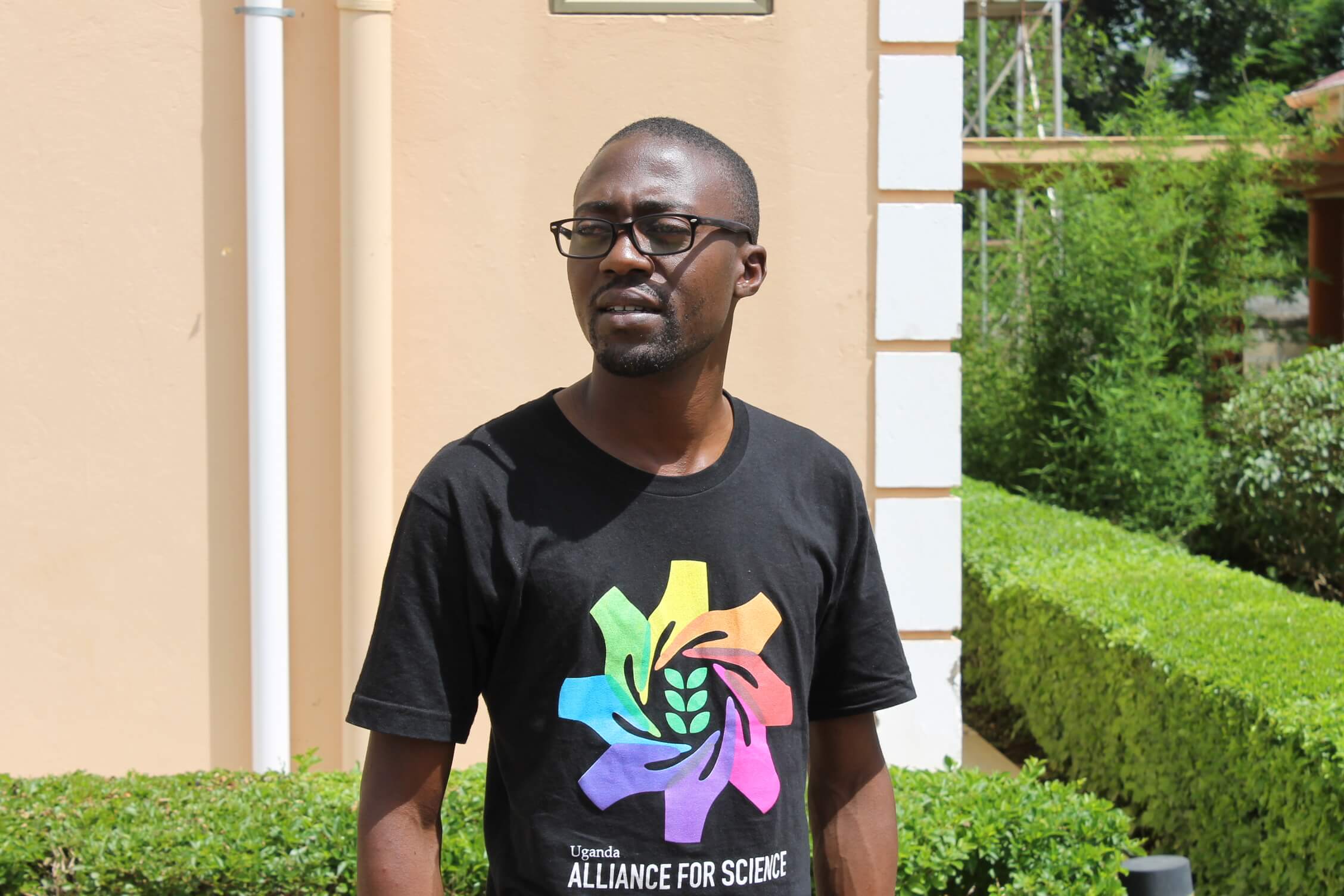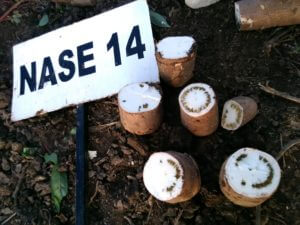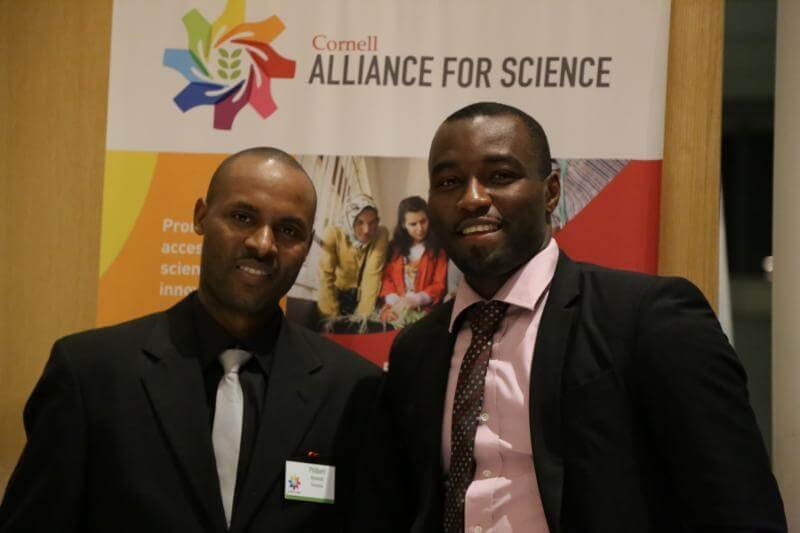Cornell Alliance for Science (CAS) got off the ground with a $5.6 million grant from the Bill & Melinda Gates Foundation in 2014, with a goal to train and help global researchers, communicators and policymakers about the potential impacts of agricultural technology and how such technology works.
It’s done a tremendous amount of outreach work over the past three years, training young scientists and communicators to more effectively understand and communicate issues in biotechnology, openly and respectfully — unless you see the world through the eyes of Stacy Malkan co-founder and co-director of the U.S. Right to Know Organization, a non-profit organization funded with hundreds of thousands of dollars from the Organic Consumers Association and dedicated to blocking biotechnology research and development. In a recent attack article published in The Ecologist, Malkan accused Cornell of “…promoting GMOs using dishonest messaging and PR tactics developed by agrichemical corporations…” She continue:
A review of the group’s materials and programs suggests that beneath its promise to“restore the importance of scientific evidence in decision making”, CAS is promoting GMOs using dishonest messaging and PR tactics developed by agrichemical corporations with a long history of misleading the public about science.
Malkan clearly thinks that training biotech communicators at Cornell to independently discuss the pros and cons of the technology is against the revolutionary spirit and vision of the university’s founders. This is a classic opening perhaps meant to stir debate or protest from sections of the alumni.
According to the Cornell Alliance for Science website, one of its centerpiece projects is the Global Leadership Fellows Program, a 12 week program which is designed to equip and empower emerging leaders who will advance Alliance shared mission of promoting access to scientific innovation as a means of enhancing food security, improving environmental sustainability and raising the quality of life globally. It’s committed to promoting evidence-based decision making and advancing science-based communications.
First hand account
In 2015, Africa sent 15 fellows, five of which were from Uganda. Three of the Ugandan fellows are public servants; two of those are under the research institutes that are working on the different transgenic crops to address various challenges affecting Uganda’s farmers, and the other one works for the Ministry of Agriculture.
I reached out to one of the fellows to find out what exactly they experienced while in the United States and whether they believed they were the target of a propaganda program designed to further the interests of “corporations” — one of Malkan’s central allegations. Nassib Mugwanya who is an outreach officer for the Uganda Biosciences Information Center, which was established by the National Agricultural Research Organization out of the need to communicate research findings in Biosciences, was one of the fellows from Uganda.

At the end of his training in Ithaca, Nassib was chosen to represent the fellows at a panel discussion organized by the United Nations. He had this to say in response to my question on propaganda allegation.
During the Fellowship, we got the opportunity to hear from various speakers with differing perspectives on GMOs (pro, neutral, against). If propaganda claims were to be true therefore, we should have come out of this fellowship either as a bunch of ‘pro/neutral, or anti-GM ‘propagandists’. I was a militant pro-GM advocate before the fellowship, but now I am a lot calmer when I meet people with differing perspectives.
As someone who spends most of the time listening to farmers’ problems, I find the debates and discussions was sometimes detached from the real issues affecting farmers. For example, not a single encounter I have had with a cassava farmer ends without asking if there’s a variety that’s been developed that is resistant to brown streak virus. Whether it is bred conventionally or through genetic engineering is not much of farmers’ interest. All a farmer needs is a solution to the problem not the debate. I have chosen to promote any scientific solution out there that could solve farmers’ problems. If that means being a propagandist, I am unapologetic about it!
On why he has transformed from being “a militant pro-GM advocate” to being “a little calm” when he meets people with differing perspectives
Despite our differences, we seem to care about the same issues with those on the other side of the debate. No one on either sides of the debate wants a starving population or polluted environment. We just differ in how best to address these problems. Being calm is a starting place to have a sober conversation on finding a common ground to addressing these problems.
When I asked him his views on those who think there is nothing good about GMOs and do not believe the two sides can have any point of intersection
If someone does not see anything good with GMOs, no amount of convincing can change their mind! The GMOs’ ‘good or bad’ debates won’t solve farmers’ problems.
What is propaganda?
Last September, a group calling themselves the Consortium for Food Safety in Africa held a conference in the Kenya’s capital of Nairobi. The conference was mainly held by webcast and podcast, and reportedly attracted many activists and environmentalists and country delegates. Other government representatives were also invited to the conference as “interested observers.”

This podcast group went on to attack the collaborative cassava mosaic disease and cassava brown streak disease research taking place in Uganda and Kenya. The claim by the anti-GMO activists was that the two countries, Kenya and Uganda, were being used for field trials of “mutant” cassava virus developed by biotechnology companies. They said the corporations were trying to develop mutant cassava viruses to attack natural cassava strains in Africa. They also claimed that these new cassava strains would put at risk the food security of 800 million Africans and also millions in South America and China who largely depend on cassava as staple food. It was also reported these anti GMO groups alleged that countries including Kenya, Malawi, Mozambique, Tanzania and Uganda were being used as test ground for release of the very virulent cassava viruses to attack the crops.
But accusations weren’t reserved just for big corporations, the governments of these countries were attacked too. They were accused of having naively accepted the solution offered by “Monsanto’s Bill Gates” to provide them with GMO cassava. They went on to say this would mean that the GMOs cassava planted in Africa would from then on come from only one source, Monsanto. The US company, they claimed, would thereby have hijacked the global cassava supply and endangered the food security of African countries, hurting small farmers and Africa as a whole. Journalists quoted delegates purportedly from South Africa and East Africa criticizing their governments for allowing the Bill Gates and Monsanto to devise schemes to force feed Africa with “toxic GMO” cassava strains while killing the “natural cassava” by using “mutant cassava viruses.”
It was all nonsense, but most people not familiar with the science or the context of the GMO debate were easily fooled.
The anti-GMO Consortium for Food Safety in Africa does not have an address or even a webpage. Similar to Malkan’s tactic, its goal was to discredit legitimate, well established organizations, including Uganda’s National Crops Resource Research institute (1954), Africa’s International Institute of Tropical Agriculture (1967), Kenya’s Agricultural Research Institute now Kenya Agriculture and Livestock Research Organization (1979), and the U.S.-funded Donald Danforth Plant Center (1998). Together, they are the institutions carrying out collaborative research on developing a transgenic cassava variety resistant to both brown streak disease and mosaic disease. Unlike the Consortium for Food Safety in Africa that is claiming these institutions are practicing “Bio-terrorism”, these institutions are accountable because they have been around for decades and have a history of transparency and good works.
Who are these people who present themselves as saints when a simple search for their association does not yield even a virtual home page? Does supporting research in genetic engineering make someone lose credibility?
Groups like Consortium for Food Safety in Africa know Africa lacks sufficient factual information on GM crops. They know that by presenting scary scenarios to sections of vocal population they could succeed in delaying Africa from accessing products of modern biotechnology — not because they care about the rural African populations vulnerable to famine, but because they want to service their anti-GMO fantasy.
What is true about GM cassava and Cassava brown streak disease?

Cassava brown streak disease was first identified in 1936 in Tanzania. Two virus strains; cassava brown streak virus (CBSV) and Ugandan cassava brown streak virus (UCBSV) are responsible for causing the disease.
Cassava brown streak disease is capable of destroying up to 100 percent of a cassava crop causing many farming families to go hungry and threatening their livelihoods. According to published reports, healthy cassava harvests could increase incomes for more than half of the households in cassava-growing regions of Uganda and Kenya. Cassava is an important source of food and income for small-holder farmers in Africa, because it grows well in conditions of drought and low soil fertility.
In 2011, Food and Agriculture Organization experts in Nairobi said cassava brown streak disease (CBSD) was on the verge of becoming an epidemic, and called for an urgent increase in funding, research, training, surveillance and other measures to help farmers and breeders. They noted the appearance of the disease in previously unaffected areas, and the lack of continued funding for research and development work to address CBSD in the region had only added to the threat already presented by Cassava mosaic disease (CMD) which was already present.
The Virus Resistant Cassava for Africa (VIRCA) project was established in 2006 and includes African and international organizations working together to develop effective solutions for the control of cassava viral diseases. Supported by this partnership, VIRCA researchers are using genetic modification techniques to improve resistance to cassava brown streak disease (CBSD) in familiar and well-liked varieties, to help cassava farmers have an abundant harvest so they can provide for their families and share the surplus with their communities.
Over the past few years, the VIRCA team has conducted several confined field trials in both Uganda and Kenya. These trials have been done with the approval and cooperation of government regulators, and under their oversight. Very effective resistance to CBSD has been observed in improved cassava plants. In collaboration with experienced cassava breeders in the region, the VIRCA project is now employing familiar techniques of conventional plant breeding to combine transgenic CBSD resistance with non-transgenic CMD resistance to develop new varieties that will provide broad-spectrum virus control.
Is Cornell University a threat to the anti-GMO propaganda economy?
Should an independent university like Cornell host a program to help communicators converse to the public about biotechnology? How are scientists, journalists and farmers suppose to have a dialogue with the politicians and the public about biotechnology when they are met with hostility simply because an activist from an anti-GMO group like Action Aid told them first that GMOs causes cancer and sterility? Is learning how to counter propaganda with facts propaganda?
When African countries lose trust in their public research institutes, will the anti-GMO activists provide solutions? What are the precautionary principle preachers doing to help farmers combat existing parasitizing and evasive plants like striga, congress weed, and lantana which have infested most of Africa’s farmlands and pasture land? Do you expect a cow or goat which has eaten grass from a poor soil to give you manure which is sufficient in nutrient?
Use of propaganda, has over the years oiled the engines that drive the anti-GMO campaigns. The biggest threat to propaganda is conveying science and facts to those who communicate and equipping them on ways to educate the public in a way that is simple and understandable. If that is what Alliance for Science is doing then it is prudent for every university to equip people on how to communicate that science in the same way.
In Uganda where Nassib and four other Alliance for Science Fellows come from, two staples — banana and cassava are under siege. They are being attacked by banana bacterial wilt and cassava brown streak disease respectively. Breeders have tried conventional methods and did not come up with any solution. In the case of cassava, several tolerant conventional varieties have been released but before long they succumb to brown streak virus.
Activists have done their best to ensure farmers do not access GM varieties by linking them to all sorts of things like sterility, impotence, and cancer. Despite, all this, Uganda’s president came out clearly in support of scientists who are working hard to provide solutions to Ugandan farmers. He asked those who are against the technology to modify their thinking. By Alliance for Science equipping these communicators with factual information and how to counter anti-science propaganda, it will help ordinary farmers to receive facts on GMOs which will inform their decision about whether they should adopt biotechnology versions of various crops or not. The decisions should be in the hands of farmers and not activists.
Isaac Ongu is an agriculturist, science writer and an advocate on science based interventions in solving agricultural challenges in Africa. Follow Isaac on twitter @onguisaac.































